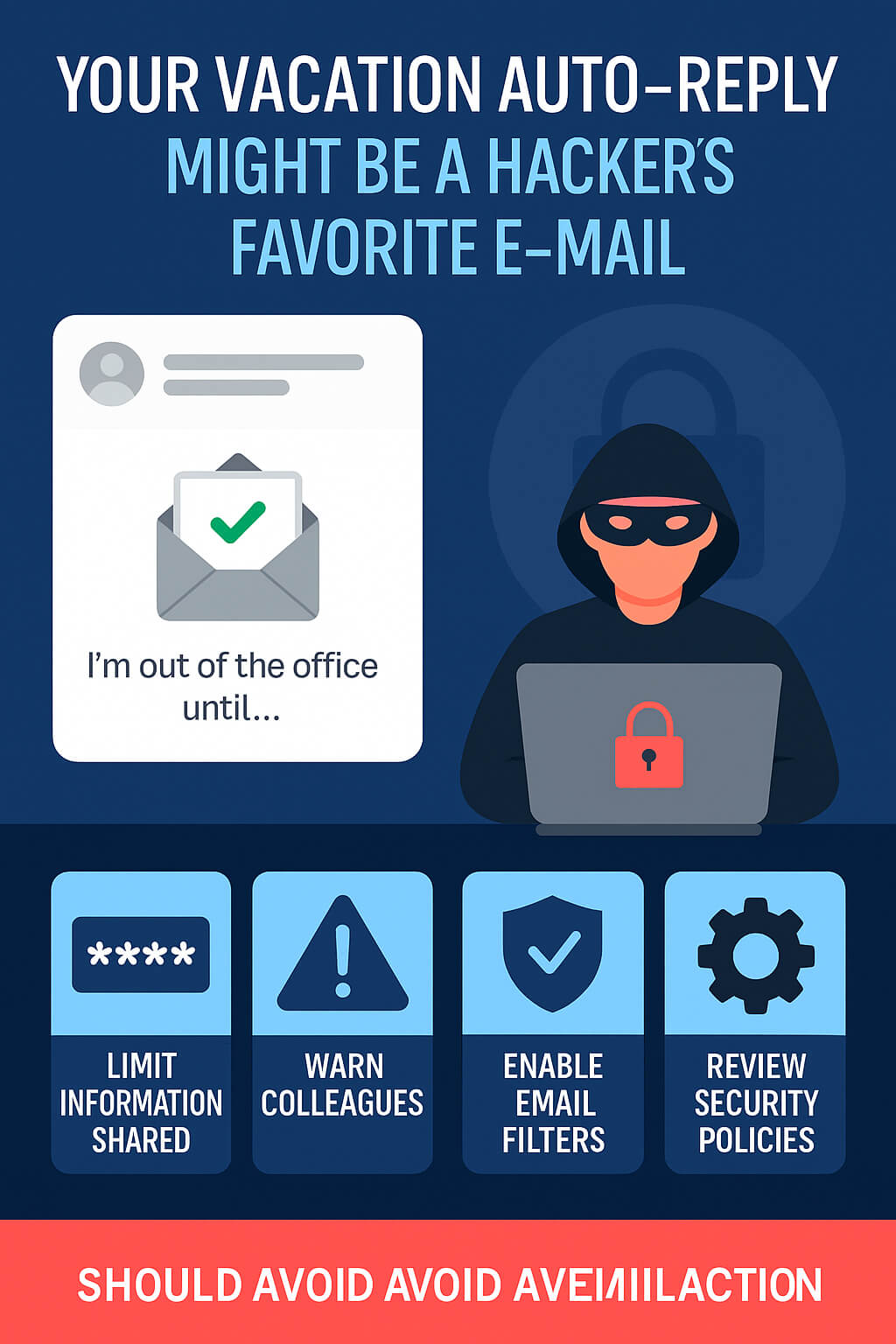“Out of office” reply may be the invitation scammers are waiting for
That cheerful “I’m out of office” reply may be the invitation scammers are waiting for. It’s not just good manners—it’s potential reconnaissance data for cybercriminals. As your inbox autoresponds, they’re already planning how to exploit your absence.
Table of Contents
- Why You’re Exposing More Than Your Vacation
- The Anatomy of an Auto‑Reply Attack
- Real‑World Spoofing Scams
- Five Defense Strategies
- Legal Compliance: The Hidden Cost of a Simple Email
- Case Study: The $85K Mistake From One Auto-Reply
- FAQ: What You Must Know About Out-of-Office Replies
- How Cybersecurity, IT Support & Managed IT Services Can Help
- Conclusion: How Computerbilities Protects North Carolina Businesses

Why You’re Exposing More Than Your Vacation
Vacation auto-replies usually include:
- Dates of absence
- Contact information for backup staff
- Job titles and internal functions
- Personal notes like “I’ll be in Mexico with limited access.”
What’s the harm? You’re telling hackers:
“I’m not here to stop you. And here’s someone else to impersonate instead.”
The Anatomy of an Auto Reply Attack
A typical Business Email Compromise (BEC) attack triggered by an auto-reply:
- You set a detailed out-of-office message.
- A cybercriminal receives it via phishing probe or scraped email list.
- They now know:
- You’re unavailable.
- Who is in charge.
- What your role is.
- They spoof your backup contact or you—sending urgent financial or credential requests.
- Your team—thinking it’s urgent—responds.
- Funds are lost or access is granted.
It’s slick, fast, and happens while you’re sipping your vacation smoothie.
Real World Spoofing Scams
- Law Firm in Raleigh, NC: An associate’s auto-reply included their paralegal’s contact. The hacker spoofed the paralegal, requested confidential case files, and those were sent—unredacted.
- Healthcare Provider: A vacation responder revealed absence + on-call nurse. A phishing link impersonating the nurse led to credential theft and a minor HIPAA violation.
- Construction Company: CEO’s email auto-replied during leave. The attacker requested a $45,000 urgent materials wire transfer from the finance team, mimicking the CEO’s language style.
The common thread? The auto-reply revealed too much.
Five Defense Strategies
Keep It Vague
Avoid names, backup contacts, or specifics.
“I am currently unavailable. I’ll respond as soon as possible upon my return. For urgent matters, contact our office directly.”
Use a central email like support@yourcompany.com.
🎓 Train Staff to Verify
- Don’t act on urgent requests sent by email alone.
- Use multi-channel verification (phone/video/in-person).
- Train on phishing red flags.
✉️ Enforce Email Authentication
Your IT team or managed IT services provider should ensure:
- SPF: Authorizes sender IPs
- DKIM: Validates message integrity
- DMARC: Combines both to block spoofed messages
These cut off impersonation attempts at the gateway.
🔐 Require Multi-Factor Authentication (MFA)
Even if credentials are leaked, MFA ensures hackers can’t access accounts without a second verification step.
👨💼 Partner with a Trusted IT Company
A proactive IT support partner can:
- Monitor anomalies 24/7
- Configure secure email environments
- Educate your team regularly
- Provide managed IT services like:
- Vulnerability scanning
- Staff phishing tests
- Policy enforcement
Legal Compliance: The Hidden Cost of a Simple Email
Your out-of-office email isn’t just a risk to productivity—it’s a compliance hazard.
🏥 HIPAA (Healthcare)
Even indirect exposure—like names of nurses or roles—can trigger scrutiny. A misdirected auto-reply in a healthcare setting could be viewed as a data leak.
🌐 GDPR (Europe)
If your out-of-office email reveals personal identifiers (full names, job titles, roles) and is received by external parties, it could fall under GDPR as a data processing issue—particularly if breached.
🔐 CCPA (California)
For companies that interact with CA residents, giving away employee data without consent—even via an automated email—may be viewed as non-compliant.
Case Study: The $85K Mistake From One Auto-Reply
Industry: Commercial Real Estate
Location: North Carolina
Incident:
- CFO was on vacation.
- Auto-reply listed assistant’s name and phone number.
- Hacker spoofed assistant, emailed a junior staff member requesting wire transfer approval.
- It was marked “urgent.”
- $85,000 was wired.
Why it worked:
- Staff assumed legitimacy because they were aware of the CFO’s vacation.
- The spoofed name was familiar and timed perfectly.
What fixed it:
- Partnering with a Managed IT Services provider (like Computerbilities) to:
- Audit email protocols
- Set safe templates
- Run phishing simulations
FAQ: What You Must Know About Out-of-Office Replies
Message: “Thank you for your email. I am currently unavailable and will respond as soon as possible upon my return. If your matter is urgent, please contact our office at [central email or phone number].”Short, respectful, and secure.
How Cybersecurity, IT Support & Managed IT Services Can Help
Every component of modern IT works together to defend your inbox—even when you’re not around.
Keyword | Practical Value |
Prevent phishing, spoofing, and email impersonation | |
IT Support | Helps your team detect and report email threats |
Email encryption, SPF/DKIM/DMARC, secure DNS | |
Managed IT Services | Continuous monitoring, auto-reply audits, phishing tests |
IT Company | Strategic advice, policy development, and legal compliance |
How Computerbilities Protects North Carolina Businesses
When you’re out of office, your business shouldn’t be vulnerable.
At Computerbilities, we specialize in Cybersecurity, IT Support, and Managed IT Services for businesses in Raleigh, Durham, Cary, and the surrounding areas.
✅ We audit and secure your email systems
✅ We implement SPF, DKIM, DMARC & MFA
✅ We educate your staff with simulated phishing campaigns
✅ We offer 24/7 monitoring so no one falls for email scams—even when you’re offline
Let us protect your inbox, so you can enjoy your vacation stress-free.

